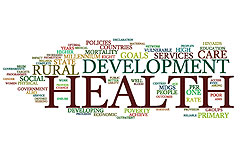 Rakshak Foundation believes that Health is a resource for everyday life, not the objective of living. Health is a positive concept emphasizing social and personal resources, as well as physical capacities. Well being and health of citizens is imperative to the progress of nation.
Rakshak Foundation believes that Health is a resource for everyday life, not the objective of living. Health is a positive concept emphasizing social and personal resources, as well as physical capacities. Well being and health of citizens is imperative to the progress of nation.
World Health Organization (WHO), in 2006, defined Health as being “a state of complete physical, mental, and social well-being and not merely the absence of disease or infirmity”. Health is maintained and improved not only through the advancement and application of health science, but also through the efforts and intelligent lifestyle choices of the individual and society. Health promotion is the science and art of helping people change their lifestyle to move toward a state of optimal health. Optimal health is defined as a “balance of physical, emotional, social, spiritual, and intellectual health” (O’Donnell).
Rakshak Foundation work on ‘Health and development’ tries to make sense of the complex links between Health, Poverty, Education and Development. It is concerned with the impact of better health on development and poverty reduction, and conversely, with the impact of development policies on the achievement of health goals. In particular, it aims to build support across governments of developing countries for higher levels of investment in health, and to ensure that health is prioritized within overall economic and development plans. In this context, ‘health and development’ work supports health policies that respond to the needs of the poorest groups.
The Millennium Development Goals
In September 2000, all 192 United Nations member states and at least 23 international organizations in New York adopted the Millennium Declaration for peace, security and development. The Summit established goals and targets to be reached by 2015. The Millennium Development Goals (MDGs) are as follows:
(1) Eradicate extreme poverty and hunger
(2) Achieve universal basic education
(3) Promote gender equality and empower women;
(4) Reduce child mortality
(5) Improve maternal health
(6) Combat HIV/AIDS, malaria, and other diseases
(7) Ensure environmental sustainability
(8) Develop a global partnership for development.




